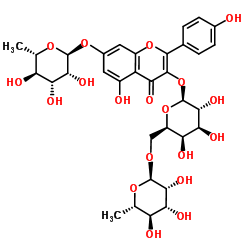Effects of selected flavonoids and carotenoids on drug accumulation and apoptosis induction in multidrug-resistant colon cancer cells expressing MDR1/LRP.
Katalin Ugocsai, Andreas Varga, P_ter Moln_r, S_ndor Antus, Joseph Moln_r
Index: In Vivo 19 , 433-8., (2005)
Full Text: HTML
Abstract
The effects of various flavonoids and carotenoids on Rhodamine 123 accumulation in multidrug-resistant Colo 320 human colon cancer cells expressing MDR1/LRP were studied. The Colo 205 cell line was used as a drug-sensitive control. Rotenon, Catechin, Neohesperidin, Naringin, Robinin, Phloridzin, Robinetin, Dihydrobinetin, Dihydrofisetin, Kampferol, Dihidroquercetin, Sakuranin and Sakuranetin were tested on Colo 320 cells: only Rotenon was found to be effective as regards multidrug resistance (MDR) reversal, while a majority of the flavonoids, such as Catechin, Neohesperidin, Naringin, Robinin, Phloridzin, Dihydrobinetin and Sakuranetin, had only marginal effects on Rhodamine 123 accumulation. The tested carotenoids (beta-Cryptoxanthin, Luteoxanthin, Anteroxanthin, Violeoxanthin, Apple peel fetoxanthin, Lutein, Violaxanthin and Neoxanthin) were able to increase Rhodamine 123 accumulation in Colo 320 cells. Verapamil was applied as a resistance-modifying positive control. The levels of apoptosis induction in drug-resistant and sensitive cell lines were also compared. The results indicated that the tested flavonoids were weak apoptosis inducers on MDR and parent cells, without significant differences. A majority of the carotenoids induced only early apoptosis, but apoptosis and cell death were not induced in MDR colon cancer cells.
Related Compounds
| Structure | Name/CAS No. | Molecular Formula | Articles |
|---|---|---|---|
 |
Robinin
CAS:301-19-9 |
C33H40O19 |
|
Roles of flavonoids in plant resistance to insects.
1986-01-01 [Prog. Clin. Biol. Res. 213 , 87-100, (1986)] |
|
Simultaneous determination of the flavonoids robinin and kae...
2011-04-28 [J. Pharm. Biomed. Anal. 55 , 109-113, (2011)] |
|
[Studies on chemical constituents of Artemisia rupestris (II...
2007-06-01 [Zhongguo Zhong Yao Za Zhi 32(12) , 1187-9, (2007)] |
|
[Robinin intoxication].
2002-09-15 [Aten. Primaria 30(4) , 258-9, (2002)] |
|
Hydrolysis of dietary flavonoid glycosides by strains of int...
1987-12-15 [Biochem. J. 248(3) , 953-6, (1987)] |